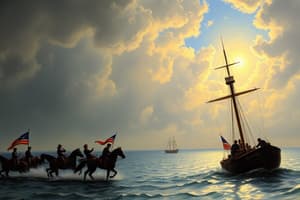Podcast
Questions and Answers
What were two short-term causes of the Spanish-American War?
What were two short-term causes of the Spanish-American War?
- Imperialism and the Assassination of Archduke Franz Ferdinand
- Yellow Journalism and the Assassination of Archduke Franz Ferdinand (correct)
- Militarism and Yellow Journalism
- Imperialism and Yellow Journalism
Which countries were part of the Central Powers of World War I?
Which countries were part of the Central Powers of World War I?
- Germany, Austria-Hungary, Ottoman Empire (correct)
- France, Britain, Ottoman Empire
- France, Britain, Russia
- Germany, Austria-Hungary, Great Britain
What was a long-term cause of World War I?
What was a long-term cause of World War I?
- The sinking of the Lusitania
- The Zimmerman Telegram
- Militarism (correct)
- The Assassination of Archduke Franz Ferdinand
What was the primary reason Great Britain declared war on Germany?
What was the primary reason Great Britain declared war on Germany?
Why did President Wilson initially oppose US involvement in WWI?
Why did President Wilson initially oppose US involvement in WWI?
How did the Zimmerman Telegram impact the US's involvement in WWI?
How did the Zimmerman Telegram impact the US's involvement in WWI?
What was a major consequence of the Treaty of Versailles for Germany?
What was a major consequence of the Treaty of Versailles for Germany?
Why did the US refuse to sign the Treaty of Versailles?
Why did the US refuse to sign the Treaty of Versailles?
Which of the following was NOT a positive effect of industrialization in the United States?
Which of the following was NOT a positive effect of industrialization in the United States?
What was the primary goal of labor unions during the industrial era?
What was the primary goal of labor unions during the industrial era?
What is a key characteristic of 'new' immigrants, compared to 'old' immigrants, as described during the late 1800s and early 1900s?
What is a key characteristic of 'new' immigrants, compared to 'old' immigrants, as described during the late 1800s and early 1900s?
Which of the following is NOT a push factor that encouraged immigration to the United States during the late 1800s and early 1900s?
Which of the following is NOT a push factor that encouraged immigration to the United States during the late 1800s and early 1900s?
How did the federal government respond to the goals of labor unions during the industrial era?
How did the federal government respond to the goals of labor unions during the industrial era?
What is nativism?
What is nativism?
The Chinese Exclusion Act of 1882 is an example of:
The Chinese Exclusion Act of 1882 is an example of:
What were the reasons for immigrants being detained at Ellis Island?
What were the reasons for immigrants being detained at Ellis Island?
What best defines a muckraker?
What best defines a muckraker?
What was Upton Sinclair's role in the Progressive Era?
What was Upton Sinclair's role in the Progressive Era?
Which two laws were passed due to the impact of 'The Jungle'?
Which two laws were passed due to the impact of 'The Jungle'?
What major reform was associated with Theodore Roosevelt?
What major reform was associated with Theodore Roosevelt?
What was the primary philosophy of W.E.B. DuBois compared to Booker T. Washington?
What was the primary philosophy of W.E.B. DuBois compared to Booker T. Washington?
What was one of the main goals of Reconstruction?
What was one of the main goals of Reconstruction?
What policy approach did President Taft primarily advocate?
What policy approach did President Taft primarily advocate?
What characterized President Johnson's plan for Reconstruction?
What characterized President Johnson's plan for Reconstruction?
What did the 14th Amendment achieve?
What did the 14th Amendment achieve?
What was a common argument against American imperialism?
What was a common argument against American imperialism?
What type of services did settlement houses provide?
What type of services did settlement houses provide?
Which of the following was NOT a method used to prohibit African Americans from voting?
Which of the following was NOT a method used to prohibit African Americans from voting?
How did the Compromise of 1877 affect Reconstruction?
How did the Compromise of 1877 affect Reconstruction?
What was the outcome of the Plessy v. Ferguson case?
What was the outcome of the Plessy v. Ferguson case?
What was a push factor associated with Westward Expansion?
What was a push factor associated with Westward Expansion?
Which act significantly encouraged settlement of the West?
Which act significantly encouraged settlement of the West?
What was one method the federal government used to assimilate Native Americans?
What was one method the federal government used to assimilate Native Americans?
What was a consequence of Jim Crow laws?
What was a consequence of Jim Crow laws?
Flashcards
Militarism
Militarism
The practice of countries competing to have the strongest military forces.
Alliance System
Alliance System
Agreements between countries to defend each other in case of war.
Nationalism
Nationalism
Strong national pride and a belief in the superiority of one's country.
Imperialism
Imperialism
Signup and view all the flashcards
Zimmerman Telegram
Zimmerman Telegram
Signup and view all the flashcards
Trench Warfare
Trench Warfare
Signup and view all the flashcards
Treaty of Versailles
Treaty of Versailles
Signup and view all the flashcards
Clear and Present Danger
Clear and Present Danger
Signup and view all the flashcards
Reconstruction
Reconstruction
Signup and view all the flashcards
Reconstruction Amendments
Reconstruction Amendments
Signup and view all the flashcards
Jim Crow Laws
Jim Crow Laws
Signup and view all the flashcards
Compromise of 1877
Compromise of 1877
Signup and view all the flashcards
Westward Expansion
Westward Expansion
Signup and view all the flashcards
Dawes Act
Dawes Act
Signup and view all the flashcards
Native American Boarding Schools
Native American Boarding Schools
Signup and view all the flashcards
Government Incentives for Westward Expansion
Government Incentives for Westward Expansion
Signup and view all the flashcards
Plessy v. Ferguson
Plessy v. Ferguson
Signup and view all the flashcards
Push Factors of Westward Expansion
Push Factors of Westward Expansion
Signup and view all the flashcards
Laissez-faire
Laissez-faire
Signup and view all the flashcards
Nativism
Nativism
Signup and view all the flashcards
Government's Role in the Industrial Revolution
Government's Role in the Industrial Revolution
Signup and view all the flashcards
Chinese Exclusion Act
Chinese Exclusion Act
Signup and view all the flashcards
Urbanization
Urbanization
Signup and view all the flashcards
Industrialization
Industrialization
Signup and view all the flashcards
Rise of Industrialists
Rise of Industrialists
Signup and view all the flashcards
Immigrants in the Industrial Era
Immigrants in the Industrial Era
Signup and view all the flashcards
What are muckrakers?
What are muckrakers?
Signup and view all the flashcards
What is Progressivism?
What is Progressivism?
Signup and view all the flashcards
Who were Jacob Riis, Lincoln Steffens, and Upton Sinclair, and what did they expose?
Who were Jacob Riis, Lincoln Steffens, and Upton Sinclair, and what did they expose?
Signup and view all the flashcards
What laws were passed as a result of Upton Sinclair's "The Jungle"?
What laws were passed as a result of Upton Sinclair's "The Jungle"?
Signup and view all the flashcards
What is the Big Stick Policy?
What is the Big Stick Policy?
Signup and view all the flashcards
What is Dollar Diplomacy?
What is Dollar Diplomacy?
Signup and view all the flashcards
What is Moral Diplomacy?
What is Moral Diplomacy?
Signup and view all the flashcards
What is the relationship between US industrial growth and imperialism?
What is the relationship between US industrial growth and imperialism?
Signup and view all the flashcards
Study Notes
Spanish-American War
- US gained control over Hawaii
- Yellow journalism
- US gained control of Cuba
World War I
- Allied Powers: France, Britain, Russia, and Italy
- Central Powers: Germany, Austria-Hungary
- Long-term causes of WWI: militarism, alliance system, imperialism, and nationalism
- Zimmerman telegram
- US reasons for entering WWI: unrestricted submarine warfare, German threats to US property, and desire to protect allies
Treaty of Versailles
- Intended to punish Germany
- Germany's colonies were taken away
- US did not sign the Treaty of Versailles
Studying That Suits You
Use AI to generate personalized quizzes and flashcards to suit your learning preferences.




